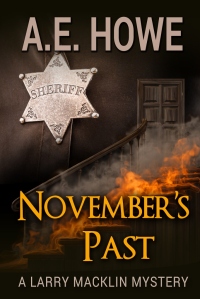This blog offers a different type of book review—one that’s combined with vocabulary building.
Included here, following a short review, are a few interesting words I found in November’s Past, the first in the Larry Macklin Mystery Series by writer A.E. Howe. Howe released November’s Past along with December’s Secrets in May, 2016, and since has produced another five books in the series: January’s Betrayal, February’s Regrets, March’s Luck, April’s Desires, and May’s Danger. Mystery fans are eating it up and sending Howe to as high as #18 in Kindle Police Procedurals, according to Amazon ranking information.
I’ve read several in Howe’s series and love the sometime reluctant detective Larry Macklin. November’s Past introduces Macklin as an investigator in rural Florida, whose father is the local sheriff. That connection doesn’t always work in the detective’s favor as he faces criticism from co-workers and his own undeserved lack of confidence. In this first book, Macklin investigates the murder of a mutilated stranger and finds a connection to a recent arson investigation. He then links both crimes to a local group of former high school friends that includes his own dad. One by one, he eliminates suspects and wonders if the crime can be solved. Howe does an excellent job building his characters and helping the reader feel for them despite their flaws, especially Macklin. I plan to continue making my way through this series and may catch up with Howe before he fills every month in the calendar with intrigue and fascinating characters.
Words from November’s Past:
Macadam: n. broken stone of even size used in successively compacted layers for surfacing roads and paths, and typically bound with tar or bitumen. <Special Usage> a stretch of road with such a surface. “This macadam makes it hard to pick up any tire tracts, but, on the good news side, if you can find the vehicle sooner rather than later, we might find some of the macadam stuck in the tire treads.”
Valkyrie: n. each of Odin’s twelve handmaidens who conducted the slain warriors of their choice from the battlefield to Valhalla. <Origin> from Old Norse Valkyrja, literally ‘chooser of the slain.’ “He was very glad that we had excluded him from the morning visit from the Valkyrie.”
Flakka: n. Pyrrolidinopentiophenone is a synthetic stimulant of the cathinone class developed in the 1960s that has been sold as a designer drug. Colloquially, it is sometimes called flakka or gravel. “Of course molly was already being replaced by flakka and whatever else someone wanted to use to get high.”
Tar Baby: n. A dummy made of tar, which cannot be struck without getting oneself hopelessly stuck to it from the story Mr. Rabbit and Mr. Fox by Joe Harris, as told by his fictional narrator, Uncle Remus. Tar baby has become short hand for a situation better avoided than confronted. (from the online Urban Dictionary) “I was beginning to think this was turning into a Tar Baby situation.”
Debonair: adj. (of a man) confident, stylish, and charming. “Mauser dragged me over to her, making it impossible for me to act suave or debonair.”
Harridan: n. a strict, bossy, or belligerent old woman: a bullying old harridan. “’Yeah, I’ll call Tim and see if he can be there to help control the harridan.’”
Autocratic adj. of or relating to a ruler who has absolute power. <Special Usage> taking no account of other people’s wishes or opinions; domineering. “Dad can be a bit autocratic.”
Nepotistic, adjective form of Nepotitism: n. the practice among those with power or influence of favoring relatives or friends, especially by giving them jobs. “I could tell that he wanted to make a snide remark in a nepotistic vein, but was resisting the urge with difficulty”
Definitions are typically from The New Oxford American Dictionary through Kindle or Wikipedia.
“The difference between the almost right word and the right word is… the difference between the lightning bug and the lightning.” — Mark Twain
What interesting words have you taken note of lately?




